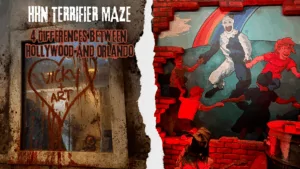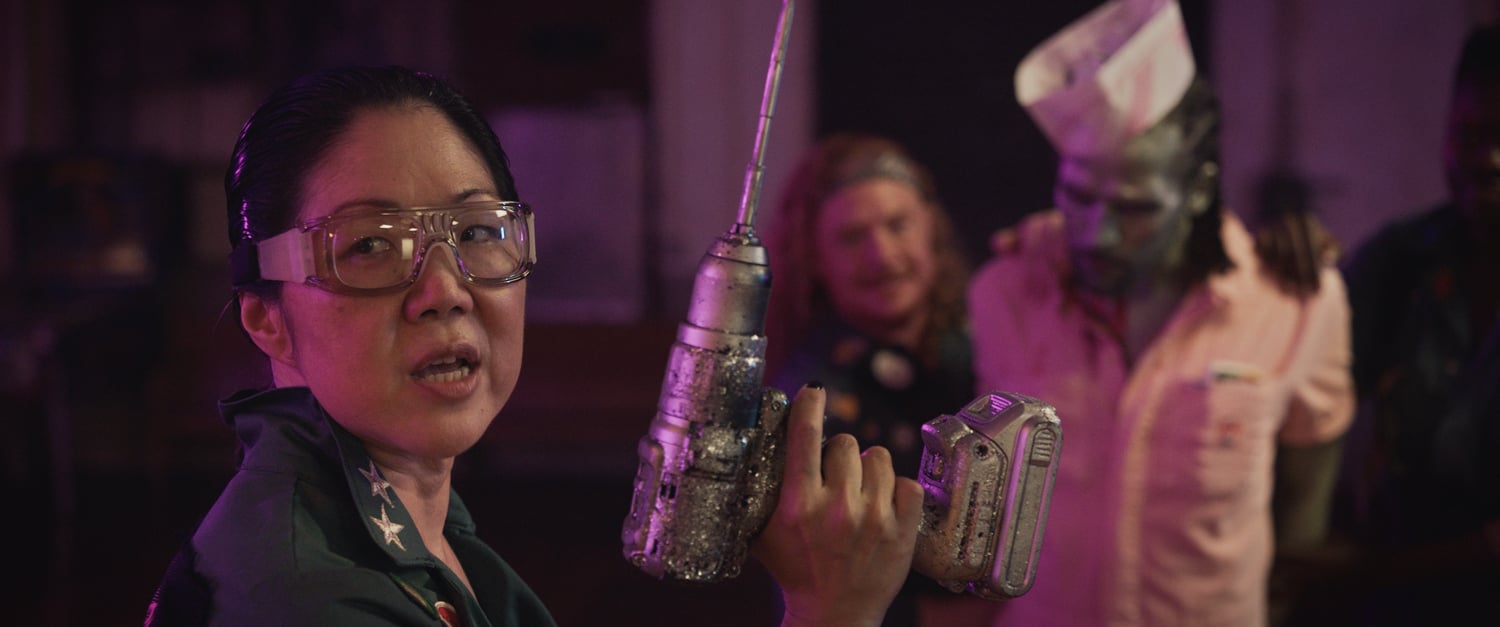QUEENS OF THE DEAD. (Photo credit: IFC/Shudder)
It’s important when a second-generation filmmaker arrives on the scene that we judge their work on its own merits. So let’s do that first: Tina Romero’s Queens of the Dead is a riotous, fiercely independent feature debut, presenting a shimmering new color in the horror comedy spectrum. It’s a crowd-pleasing feast of genre and laughs that’s destined to become a perennial favorite.
That said, it’s impossible to talk about the film without acknowledging the legacy of which it is now a part; what’s exciting is that the film not only knows this, but embraces it. No matter how we see ourselves, our legacy is something that is ultimately, if unfairly, decided by other people. Tina Romero, who learned to walk on the set of her father’s film Day of the Dead, and who worked on her dad’s later movies, probably has a front-row seat to how a legacy can happen with or without the individual’s say-so. Small wonder then that the theme of legacy is front and center in her debut feature film, which finds the filmmaker confronting, owning, and transforming her own. If this is how it’s going down, Romero seems to be saying, she’s at least gonna pick the playlist at the party.
George A. Romero invented the modern zombie with Night of the Living Dead, and in the 57 years since, no one’s really improved on his formula. In Queens of the Dead, Tina Romero picks up the baton of not only her father’s cinematic invention, but his penchant for centering marginalized protagonists. Here it’s all pushed to its next logical step, as a group of queer characters find themselves trapped in a Bushwick nightclub, fending off a horde of the living dead.
 TrendingCREEP’s Mark Duplass Launches Found Footage Fund For Trans Filmmakers
TrendingCREEP’s Mark Duplass Launches Found Footage Fund For Trans Filmmakers
But legacy is not just a behind-the-scenes meta narrative in Queens; it’s very much on the mind of its protagonists, as well. Dre (Katy O’Brian) is a promoter and DJ whose drag event “Yum” is a bit of a zombie itself – talent keeps flaking, crowds aren’t showing, and the toilet’s not working, but Yum nonetheless lumbers on, and Dre’s desperately hustling to go out on a win before maybe calling it a day. Any indie creator (and probably more than one in the Romero household over the years) can relate to Dre’s struggle. “This is my legacy!” she literally says to her wife Lizzie (Riki Lindhome) during a fraught phone call. On the other end of the phone, a supportive Lizzie (a nurse whose hospital shift is about to get really, really bad) holds back some personal news that will redefine Dre’s idea of legacy.
Meanwhile, retired drag queen/nurse’s aide Sam (Jaquel Spivey) wrestles with their own legacy, having hung up their drag persona after anxiety snuffed their spark and cratered their professional reputation. Sam arrives at the club to help with Dre’s floundering event, where we meet Ginsey (Nina West), Sam’s drag mother and mentor; wannabe performer/dealer Nico (Tomás Matos, who steals every scene they’re in); and Lizzie’s plumber brother Barry (Quincy Dunn-Baker), the film’s token straight. (Cheyenne Jackson is also fun to see here, playing against type as a bro-ish bartender.)
Then, as per genre tradition, the zombies come and try to eat everyone. A zombie siege movie is a shopworn concept, to be sure, but Tina Romero, along with screenwriter Erin Judge, peoples her film with memorable, hilarious characters who react to this scenario in ways we’ve never seen on screen, resulting in both pathos and a sharp, sustained level of comedy. With a cast this colorful and talented, Queens might be the most character-driven zombie movie the western world has ever produced, an object lesson for indie filmmakers about leaning into your assets. The entire cast (including Jack Haven as a cartoonishly femme club employee and Margaret Cho as her tough-as-nails partner, Pops) earn huge laughs and work together to bring a refreshing take on the zombie apocalypse. Dunn-Baker’s Barry is particularly hilarious in his hapless attempts to navigate both the end of the world and people’s pronouns.
 Trending4 Differences Between Universal HHN TERRIFIER House In Hollywood And Orlando
Trending4 Differences Between Universal HHN TERRIFIER House In Hollywood And Orlando
Equally impressive is what Romero has done with her lead performer. If your only awareness of Katy O’Brian is her intense, compelling work in Love Lies Bleeding, or as the supporting badass with presence for days in mainstream blockbusters, her performance in Queens will come as a revelation. Earnest, vulnerable, and possessing an innate sense of comic timing, Dre is a role that will change how you (and, one hopes, casting directors) see the actress, and could affect the trajectory of her career in an industry that otherwise might not have seen the possibilities.
Another refreshing element is Tina Romero’s unabashed embracing of her father’s legacy within the film. It’s self-aware, kind of cheeky – anyone mad at a cameoing Tom Savini looking into the lens and saying “This is not a George Romero movie” might be at the wrong party – and genuinely emotional in places. Similar to how memories of departed loved ones sneak up on us, unexpected echoes of Tina’s dad might blindside his fans, due in no small part to composers Blitz//Berlin’s deft and surprising use of familiar notes from the Romero canon. The entire score works brilliantly on its own (and kind of has to, for a film set in this world), but there’s an “if you know, you know”-type nod to the elder Romero threaded throughout, and it’s deployed by Romero and Blitz//Berlin both tastefully and from the heart; the film is all the better for it.
That said, Queens of the Dead has its own voice, its own roadmap, and will likely have, in the very near future, its own rabid fanbase. Its originality is its secret weapon; where it veers from most cinematic zombie lore is not just zombies who bleed glitter, nor undead Zoomers still trying to take selfies or livestream. Rather, the most exciting new element here is a stubborn streak of positivity that’s commenting on the world beyond the screen. Her dad’s movies reflected society, sure; Tina Romero does this while pushing back against the rotten tide. Queens of the Dead feels like optimistic counter-programming in a cultural landscape focused on bile and division. Yes, the film says, the world is collapsing and everyone outside your door wants you dead, but we’re gonna get through this shit together. By the end of Queens, you might decide that maybe this community is onto something, and that Tina Romero’s own legacy is off to a fantastic start.

